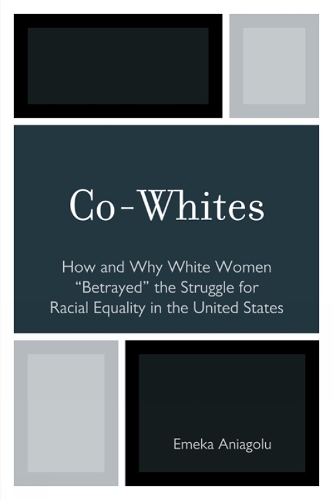
Co-Whites: How and Why White Women 'Betrayed' the Struggle for Racial Equality in the United States
(Paperback)
Publishing Details
Co-Whites: How and Why White Women 'Betrayed' the Struggle for Racial Equality in the United States
By (Author) Emeka Aniagolu
University Press of America
University Press of America
29th November 2010
United States
Classifications
General
Non Fiction
Social discrimination and social justice
Ethnic studies / Ethnicity
Feminism and feminist theory
Ethnic groups and multicultural studies
Gender studies: women and girls
305.420973
Physical Properties
Paperback
354
Width 155mm, Height 232mm, Spine 21mm
538g
Description
Co-Whites discusses race and gender politics and traces the role of women in Western and non-Western political systems. Aniagolu examines the dynamics of race and gender in the United States, starting from the colonial and antebellum periods, leading up to the American Civil War and Reconstruction, through the Civil Rights era of the 1960s, to the present day. The work explores how white American women, in their search and struggle for gender equality in the United States, related to three principal streams in America's socioeconomic and political history: white supremacy, women of color-especially African American women, and the freedom and civil rights struggle for racial equality.
The United States has irreversibly become a multiracial and multicultural democracy and white supremacy has become untenable; however, Aniagolu concludes that white American women collaborated with white American men as "Co-Whites" or co-partners in the management and maintenance of white supremacy in the United States. Well-researched and lucidly written, the work makes intellectually and historically coherent a subject matter often muttered in small circles and that takes the form of scholarly "civil wars" inside "Women's Studies" between white American and African American women scholars and schools of thought. The work grapples with a serious issue in light of the 2008 presidential elections in the United States, offering insightful explanations certain to evoke lively debate in university classrooms, amongst professorial colleagues, and in the general public.
Reviews
Co-Whites raises important questions about the Second Wave of Feminism in the United States including whether its leaders failed at a critical juncture in American history to participate in revolutionary change regarding racial justice. Readers will gain insights into the historic fault lines between the Civil Rights Movement and the Women's Movement, and the position of white women within a society historically dominated by a white patriarchal order. -- Richelle D. Schrock, Ph.D., director, women and gender studies, Ohio Wesleyan University
highly recommended for change agents who have answered the call of racial equality; 'co-whites' whose status have prevented them from even knowing that there is such a call; and people of other persuasions who will find in this work a language to analyze as well as to express their own oppression -- Dr. Tanya Tammie Fowler, bio-medical anthropologist, Temple University
Author Bio
Emeka Aniagolu is originally from Nigeria and teaches African and African American history and politics at Ohio Wesleyan University. He has written two works of fiction, three works of historical fiction, and three works of non-fiction.
